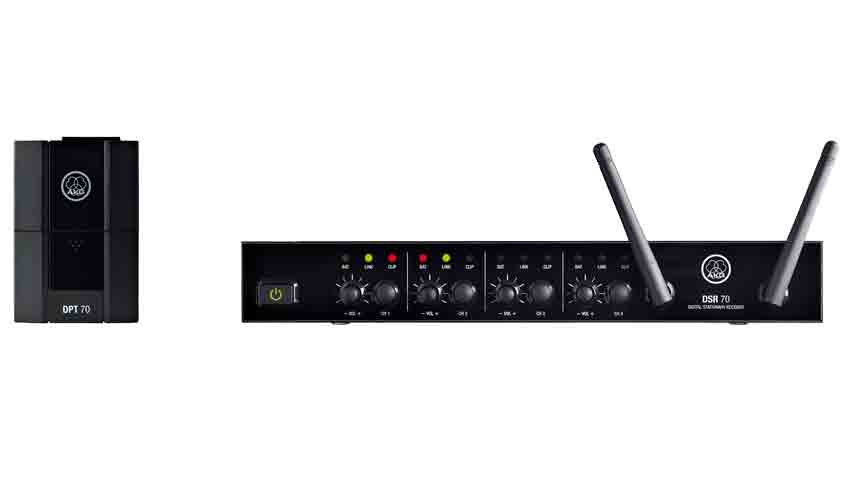MusicRadar Verdict
An excellent- sounding wireless system that shouldn't pose any performance problems.
Pros
- +
Impressive performance. Simple to set up and use.
Cons
- -
Cheap jack plug on the connecting cable.
MusicRadar's got your back
The world of wireless systems is in turmoil right now, because there's still a great deal of confusion concerning which frequencies will actually be available or legal in the UK by the end of this year. A question mark hangs over the continued use of many older radio setups, but new products aim to steer clear of any change-related performance problems.
One way is to go digital, and AKG has opted to use the 2.4GHz range, which allows worldwide, licence-free operation. However, this area is already the domain of various Wi-Fi and Bluetooth devices, but these are low-power, and the company obviously envisages minimal external interference issues. Even so, AKG still advises that any such equipment operating nearby should ideally be switched off.
"Sound quality is full-range and dynamic, and pleasingly free of unwanted colouration and noise"
The DMS70 Dual is a two-channel version of the DMS70 Quattro four-channel digital wireless model that was introduced earlier this year. Apart from reduced channel choice, the Dual equivalent employs a pretty similar spec, including 24-bit 48kHz audio coding, intended to provide- uncompressed, high-quality audio and a flat frequency response. Also found onboard here is Dynamic Frequency Selection (DFS), which automatically chooses the cleanest frequency band.
The DMS70 Dual Instrumental Set comprises a DPT70 transmitter (with batteries), the partner DSR70 Dual two-channel receiver, one MKG L cable and a 12-volt DC power supply. The latter includes four slide-in plug sections that should match sockets virtually anywhere on the planet. Components are also available individually, so you can purchase another transmitter for use with the receiver's second channel.
DPT70 transmitter
This belt-pack type is equipped with a strong spring clip. Although lightweight, the slim- line plastic casing seems sturdy, and the lower half of the front slides down to reveal a compartment containing two AA batteries. Also within is a super-small gain control, plus an equally diminutive connect button. The latter determines and checks channel choice on the receiver.
The on/off push switch is on top of the transmitter, sited under a slide-over cover to prevent accidental operation. An accompanying LED confirms connection and battery status, while signal input is via a mini-XLR jack.
The supplied connecting cable is quite meaty and long, with a standard jack plug on one end and a mini-type, locking XLR socket at the other. The latter is a reassuringly firm fit, but the former is an inexpensive example that's a bit miserly.
DSR70 Dual receiver
This comes in a half-rack size, lightweight metal casing with a plastic front panel. Alongside an illuminated on/off switch is a volume pot plus a connect button per channel. The latter assigns the transmitter and provides a check for the same, while LEDs show transmitter battery condition, operation and signal level. The remaining fascia is occupied by two short and chunky antennas.
Round the back are two channel output jacks and an input for the 12-volt DC power pack. Also here is a small three-position slide switch that provides low, mid or high degrees of auto correction to combat audio interference.
Sounds
Sound quality is full-range and dynamic, and pleasingly free of unwanted colouration and noise. The operating range of up to 30 metres indoors and 50 metres outside should suit most needs, with minimal latency and no drop-outs.
Wireless systems offer the freedom and convenience of lead-free performance, while hopefully avoiding outside interference. AKG's DMS70 Dual setup combines these attributes with two independent channels, impressive audio and easy installation for a competitive asking price. This makes it undeniably attractive to any player considering cutting the aural umbilical cord.
“Chinese Democracy was a boring record. But calling it Guns N' Roses was not honest. It was totally a solo record”: GN’R’s ex manager takes aim at Axl Rose
“Instead of labouring over a perfect recreation, we decided to make an expanded counterpart”: Chase Bliss teams up with Mike Piera for Analog Man collab based on the legendary King Of Tone
“It’s about delivering the most in-demand mods straight from the factory”: Fender hot-rods itself as the Player II Modified Series rolls out the upgrades – and it got IDLES to demo them










